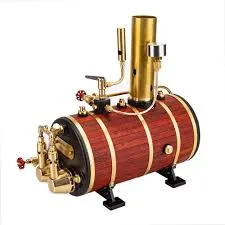
نوفمبر . 13, 2024 10:14 Back to list
hot water boiler capacity calculation
Understanding Hot Water Boiler Capacity Calculation
Hot water boilers play a critical role in both residential and commercial heating systems. Determining the correct capacity for a hot water boiler is essential to ensure efficiency, reliability, and cost-effectiveness. This article delves into the factors impacting boiler capacity and the method for calculating the appropriate size for a hot water boiler.
Importance of Boiler Capacity
Boiler capacity is measured in British Thermal Units (BTUs) per hour, indicating the amount of heat the boiler can produce. If the boiler is too small for the heating demands, it will struggle to maintain the required temperature, leading to increased energy consumption and higher utility bills. Conversely, an oversized boiler will cycle on and off frequently, which can cause wear and tear and reduce its lifespan. Therefore, proper capacity calculation is vital for optimizing performance and energy efficiency.
Factors Influencing Boiler Capacity
1. Heat Demand The primary factor determining boiler size is the heat demand of the space to be heated. This is influenced by several aspects, including the climate, insulation quality, window types, and the overall size of the building.
2. Hot Water Requirements In addition to space heating, if the boiler also supplies hot water for domestic use (showers, sinks, etc.), this must be taken into account. The peak hot water demand will significantly influence the overall capacity needed.
3. System Design The design of the heating system, including the types of radiators or underfloor heating, affects how the heat is distributed. Some systems may require a larger capacity to ensure consistent heating.
4. Boiler Efficiency The efficiency rating of the boiler, typically expressed as a Percentage Annual Fuel Utilization Efficiency (AFUE), plays a role in capacity calculations. High-efficiency boilers may require slightly lower capacities due to their improved performance.
Calculating Boiler Capacity
To calculate the appropriate capacity of a hot water boiler, follow these steps
Step 1 Determine the Heat Loss
Calculate the heat loss of the building, which is the amount of heat energy lost through walls, windows, doors, and ceilings. This can be done using heat loss formulas or by conducting a Manual J load calculation.
hot water boiler capacity calculation

A simplified formula for heat loss is
\[ \text{Heat Loss (BTU/hr)} = \text{Area} \times \text{Temperature Difference} \times \text{Insulation Factor} \]
Where - Area is the total square footage of all heated spaces. - Temperature Difference is the difference between the desired indoor temperature and the average outdoor temperature. - Insulation Factor varies based on the building's insulation quality.
Step 2 Determine Hot Water Demand
Estimate the peak hot water demand for your application. For residential buildings, this can be based on the number of appliances and fixtures that will require hot water simultaneously. A common starting point for calculations is
\[ \text{Peak Hot Water Demand (GPM)} = \text{Total Fixtures} \times \text{Fixture Demand} \]
Where the fixture demand varies; for example, a shower may require 2-3 GPM, while a sink may need about 1-2 GPM.
Step 3 Combine Heating and Hot Water Loads
Combine the heat loss requirement and the hot water demand to determine the total capacity needed for the boiler
\[ \text{Total BTU/hr} = \text{Heat Loss (BTU/hr)} + (\text{Hot Water Demand (GPM)} \times 60 \times 8,000) \]
Here, the factor of 8,000 converts gallons per minute of hot water demand to BTUs.
Conclusion
Choosing the right hot water boiler capacity involves understanding the unique heating demands of your building, accounting for heat loss, and the hot water requirements. Proper capacity calculation is crucial to ensure energy efficiency, comfort, and longevity of the heating system. Always consult with a heating professional to ensure that you accurately assess your specific needs and comply with local codes and regulations, leading to smart and sustainable heating solutions.
-
High-Efficiency Commercial Oil Fired Steam Boiler for Industry
NewsJul.30,2025
-
High-Efficiency Biomass Fired Thermal Oil Boiler Solutions
NewsJul.30,2025
-
High Efficiency Gas Fired Thermal Oil Boiler for Industrial Heating
NewsJul.29,2025
-
High-Efficiency Gas Fired Hot Water Boiler for Sale – Reliable & Affordable
NewsJul.29,2025
-
High Efficiency Biomass Fired Hot Water Boiler for Industrial and Commercial Use
NewsJul.29,2025
-
High-Efficiency Biomass Fired Hot Water Boiler for Industrial Use
NewsJul.28,2025
Related PRODUCTS






















